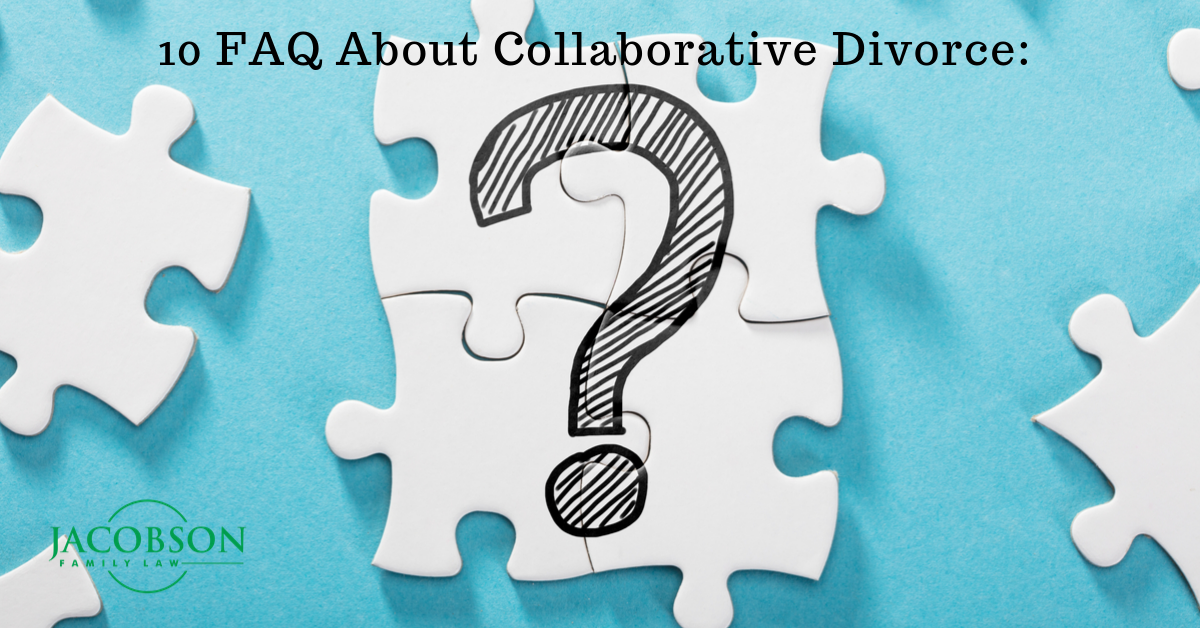
The Collaborative Divorce process is a healthier way to divorce in Maryland. You and your spouse maintain control over the outcome in deciding what is best for yourselves and your family. Here are the answers to some common questions about Collaborative Divorce in Maryland.
1) What is a Collaborative Divorce?
Collaborative family law is founded on three principles:
- A pledge not to litigate disputes in court.
- An honest, voluntary, prompt, and good-faith exchange of relevant information without formal discovery.
- A commitment to strive for solutions that take into account the highest priorities of both parties and their children.
2) What is the difference between a Collaborative Divorce and a Conventional Divorce?
The key difference between Collaborative Practice and Conventional Divorce is the pledge to reach an agreement before going to court. You and your spouse keep control of the decisions yourselves, rather than giving it up to a judge. In order to accomplish that, all of the parties consent, in writing, to be part of a respectful process that leads to an out-of-court resolution. With Collaborative Divorce, the goal is to develop effective relationships, solve problems jointly, and prevent a court battle.
3) Is Collaborative Divorce a good fit for me?
Conventional divorce can be emotionally draining and damaging. If you’re looking for a healthy alternative that helps maintain respect during the divorce process and focuses on amicable solutions, collaborative divorce may be a good fit for you.
If you agree with the majority of the values listed below, collaborative divorce is likely to be a effective option for you:
- Maintaining the tone of respect, even when during disagreements.
- Prioritizing the needs of your children.
- Your needs and those of your spouse requiring equal consideration, and listening objectively.
- Working creatively and cooperatively solving issues.
- Behaving ethically toward your spouse.
- Choosing to maintain control of the divorce process with your spouse, and not relegate it to the courts.
4) How can I get my spouse to agree to the Collaborative Divorce process?
If you decide that Collaborative Divorce is a good fit for you, remember that moving forward with the Collaborative Divorce process must be voluntarily agreed upon by each party. Therefore, you will need to discuss with your spouse why you feel that this process is the better option. Remind them that by retaining separate collaboratively trained divorce attorneys, you can receive guidance and insight to effectively work towards a resolution together. You may also want to provide them resources such as Howard County Collaborative Practice or the Collaborative Project of Maryland so that your spouse can learn more about Collaborative Divorce and collaboratively trained professionals.
5) What is the overall focus within the Collaborative Divorce process?
Open communication is the biggest focus within the Collaborative Divorce process. Even under the best of circumstances, communication can be strained as a relationship is ending. Yet keeping the lines of communication open is essential for reaching an agreement. Collaborative Divorce provides for face-to-face meetings with you, your spouse, your respective lawyers and your team as needed. These sessions are intended to produce an honest exchange of information and expression of needs and expectations. When the issues are openly discussed, problem solving can be direct and solutions-oriented.
6) What is the difference between Mediation and Collaborative Divorce?
While Mediation generally involves only the mediator and both parties, Collaborative Divorce allows for additional professionals to be present during sessions. During the Collaborative Divorce process, each party is represented by an attorney and may engage other professionals as needed, such as mental health specialists, financial professionals, and/or other experts to provide support.
Additionally, during mediation a neutral mediator can provide information that can help parties make their own decisions, though it cannot be legal advice. During Collaborative Divorce however, lawyers can provide legal advice and suggestions to aid in the decision making process while staying out of a courtroom.
7) How long does the Collaborative Divorce Process take?
The duration of the Collaborative Divorce process depends on what issues have been agreed to prior to your sessions with the collaborative professionals, and what issues still need to be addressed. That being said, on average, pre-decree collaborative divorce can be completed in 4-10 sessions between the parties and professionals participating in the Collaborative Divorce.
Also, the amount of time spent in Collaborative Divorce sessions is contingent upon you and your spouse’s willingness to come to agreements that are equitable for the both of you, along with your willingness to do what is in the best interests of your children.
The typical collaborative divorce case is settled in less time than conventional divorce litigation in court.
8) Is Collaborative Divorce less expensive than court litigation?
Yes, generally speaking Collaborative Divorce is typically less expensive than traditional court litigation. Because Collaborative Divorce provides a low-cost alternative to conventional divorce, this often resolves in much less time than court litigation which saves on costs.
9) Is the Collaborative Divorce process confidential?
Yes. The Collaborative Divorce process is considered very confidential. Any statement made in your meetings with your attorneys and assisting professionals is absolutely not admissible in court. All information exchanged during your Collaborative Divorce meetings is confidential, aside from any piece of information that would be required by law or of the court in order to resolve an issue at hand.
10) Can you terminate the Collaborative Process once started?
Yes. Either client can always choose to end the collaborative process and go to court. However, if the collaborative process terminates, both clients will be required to hire new attorneys.
If you are considering a Collaborative Divorce, schedule an appointment with Jacobson Family Law today for your initial consultation and take the first step to Keeping the Drama out of Divorce.




